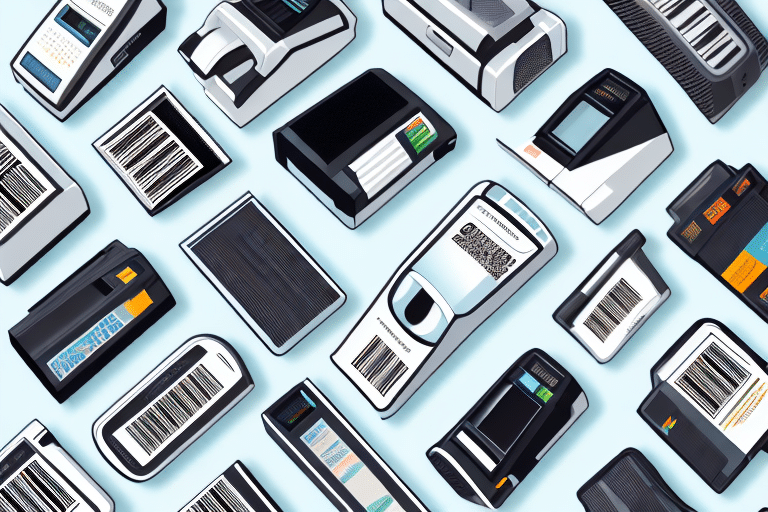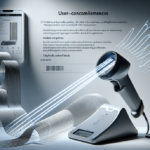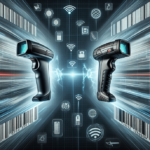Top Barcode Scanners for E-Commerce in 2024
Barcode scanners are indispensable tools for e-commerce businesses, enabling efficient and accurate inventory tracking and providing a seamless checkout experience for customers. As technology advances, barcode scanning continues to evolve, offering new features and capabilities. In this comprehensive guide, we discuss the top barcode scanners for e-commerce in 2024, explore their impact on the industry, and provide insights on selecting the right scanner for your business needs.
How Barcode Scanners Have Transformed E-Commerce
Prior to the widespread adoption of barcode scanners, managing inventory was a labor-intensive and error-prone process. Manual counting not only consumed valuable time but also increased the likelihood of inaccuracies. The introduction of barcode scanners revolutionized inventory management by allowing businesses to rapidly and precisely scan products, updating inventory levels in real-time.
This technological advancement has significantly enhanced operational efficiency, minimized errors, and enabled businesses to maintain optimal inventory levels. Moreover, barcode scanners have streamlined the customer shopping experience by facilitating quick and accurate checkouts, thereby boosting customer satisfaction and loyalty.
According to a [report by Grand View Research](https://www.grandviewresearch.com/industry-analysis/barcode-scanner-market), the global barcode scanner market is expected to grow substantially, driven by the increasing demand for automation and real-time data capture in various industries, including e-commerce.
Key Considerations When Choosing a Barcode Scanner
Types of Barcode Scanners
Barcode scanners come in various types, each suited to different business environments and needs:
- Handheld Scanners: Portable and versatile, ideal for businesses with diverse scanning requirements.
- Corded Scanners: Reliable and consistent, best suited for high-volume scanning in fixed locations.
- Cordless Scanners: Offer mobility without the constraints of cables, suitable for dynamic or large workspaces.
- Presentation Scanners: Stationary scanners designed for retail settings, facilitating quick item scanning.
- 2D Scanners: Capable of reading both 1D and 2D barcodes, including QR codes, expanding their utility.
Scanning Capabilities
When selecting a barcode scanner, consider its scanning distance, speed, and accuracy. High-volume e-commerce operations benefit from scanners with fast scanning speeds and the ability to read damaged or poorly printed barcodes.
Connectivity Options
Ensure that the scanner integrates seamlessly with your existing systems. Common connectivity options include USB, Bluetooth, and wireless networks. Compatibility with inventory management and point-of-sale (POS) software is crucial for streamlined operations.
Durability and Build Quality
The scanner should withstand the demands of your business environment. For instance, a rugged scanner is essential for warehouse settings, while a sleek design may be preferable for retail floors.
Compatibility with Barcode Types
Verify that the scanner supports the types of barcodes used in your business, such as UPC, EAN, or QR codes. 2D scanners offer greater flexibility by handling a wider range of barcode formats.
Top 10 Barcode Scanners for E-Commerce in 2024
After extensive research and user feedback, we have identified the top barcode scanners that excel in performance, reliability, and value for e-commerce businesses:
1. Zebra DS3678-ER
- Pros: Extended range, robust build quality, excellent scanning accuracy.
- Cons: Higher price point.
2. Honeywell Granit 1981i
- Pros: Extremely durable, suitable for harsh environments.
- Cons: Heavier than some alternatives.
3. Motorola DS4308
- Pros: Fast scanning speeds, reliable performance.
- Cons: Complex software setup.
4. Datalogic Gryphon GBT4500
- Pros: Versatile barcode reading (1D and 2D), ergonomic design.
- Cons: Limited scanning range compared to others.
5. Honeywell Voyager 1472g
- Pros: High accuracy, reliable connectivity.
- Cons: Premium pricing.
6. Zebra DS2208
- Pros: User-friendly, reliable performance.
- Cons: Limited advanced features.
7. NADAMOO Wireless Barcode Scanner
- Pros: Portable, easy to use.
- Cons: Durability concerns reported by some users.
8. Datalogic Gryphon GD4500
- Pros: Rugged design, suitable for heavy use.
- Cons: Higher cost.
9. Honeywell Voyager 1250g
- Pros: Durable, long lifespan, fast and accurate scanning.
- Cons: Higher upfront investment.
10. Motorola DS6707
- Pros: Feature-rich, competitive pricing.
- Cons: May have a steeper learning curve for new users.
Pros and Cons of Top Barcode Scanners
Each barcode scanner offers unique advantages and potential drawbacks. For example, the Zebra DS3678-ER provides an extended scanning range and exceptional durability, making it ideal for high-demand environments. However, its higher price may be a barrier for smaller businesses. On the other hand, the NADAMOO Wireless Barcode Scanner is praised for its portability and ease of use, though some users have reported durability issues over time.
Understanding the specific needs of your e-commerce operation will help you weigh these pros and cons effectively, ensuring you select a scanner that aligns with your business requirements.
User Reviews: What E-Commerce Businesses Are Saying
Customer reviews are invaluable for gauging the real-world performance of barcode scanners. Users consistently rate the Honeywell Voyager 1472g and the Zebra DS2208 highly for their accuracy and reliability. The NADAMOO Wireless Barcode Scanner receives commendations for its portability and user-friendly interface, though some users have noted durability concerns after extended use.
The Datalogic Gryphon GD4500 stands out for its rugged design, making it a favorite among businesses that require robust equipment capable of handling heavy use. These reviews highlight the importance of selecting a scanner that not only meets your technical requirements but also aligns with your operational environment.
Best Value for Money: Top Picks
When evaluating barcode scanners based on value for money, the Motorola DS6707 emerges as a strong contender. It offers a comprehensive set of features at a competitive price, making it an excellent choice for businesses seeking quality without a hefty investment. The NADAMOO Wireless Barcode Scanner is also a great option for budget-conscious businesses, providing essential scanning capabilities at an affordable price point.
For those willing to invest more upfront, the Honeywell Voyager 1250g offers exceptional durability and long-term reliability, ensuring a cost-effective solution over its extended lifespan. Its advanced scanning capabilities cater to businesses with high-volume scanning needs, justifying the higher initial cost with long-term benefits.
Optimizing Your E-Commerce Operations with the Right Barcode Scanner
Integrating the appropriate barcode scanner into your e-commerce operations can significantly enhance efficiency and accuracy. Real-time inventory updates prevent stockouts and overstock situations, while accurate scanning minimizes errors in order fulfillment. Additionally, utilizing a scanner during the checkout process accelerates transactions, enhancing the overall customer experience.
Furthermore, the data collected through barcode scanning can inform strategic decisions related to inventory management, sales forecasting, and marketing initiatives. By leveraging this data, businesses can optimize their operations to better meet customer demands and streamline their supply chain processes.
Future Trends in Barcode Scanning for E-Commerce
The landscape of barcode scanning is continually evolving, with several emerging trends poised to shape its future in the e-commerce sector:
- Mobile Barcode Scanners: Increased adoption of mobile devices with built-in scanning capabilities offers greater flexibility and mobility in inventory management.
- Advanced Scanning Technologies: Innovations such as enhanced 2D barcode scanning and improved image recognition are expanding the capabilities of barcode scanners.
- Cloud-Based Integration: Integration with cloud-based inventory management systems enables more efficient data storage and real-time collaboration across multiple locations.
- AI and Machine Learning: Incorporating artificial intelligence can improve scanning accuracy and predictive analytics, providing deeper insights into inventory trends.
Staying abreast of these trends will help e-commerce businesses maintain a competitive edge by adopting the latest technologies that enhance operational efficiency and customer satisfaction.
Conclusion
As the e-commerce industry continues to expand, the role of barcode scanners in optimizing inventory management and enhancing the customer experience becomes increasingly critical. Selecting the right barcode scanner involves evaluating various factors, including scanner type, scanning capabilities, connectivity, and durability. By considering the top barcode scanners for e-commerce in 2024 and understanding their strengths and weaknesses, businesses can make informed decisions that support their operational needs and drive growth.
Embracing advanced barcode scanning technologies and integrating them effectively into your business processes will not only streamline operations but also provide valuable data insights, paving the way for sustained success in the competitive e-commerce landscape.




















